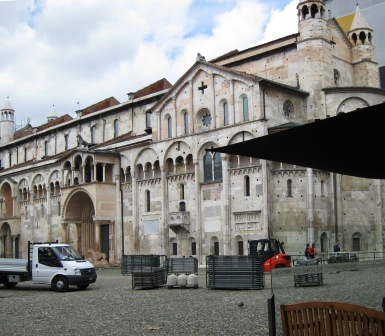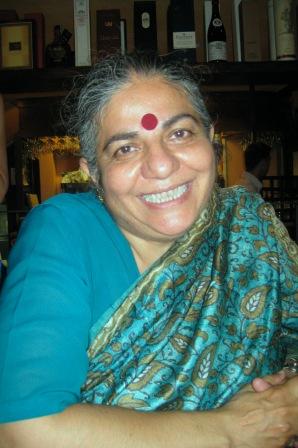
For more than a century, farms have been getting bigger while seeds, fertilization and pest control have been getting more uniform. Led by farm suppliers, it has raised productivity. But negative byproducts of this trend include increasing chemical dependence and loss of biodiversity. Ecofeminist Vandana Shiva is at the Organic World Congress to protest the human and environmental cost of monoculture. The pendulum may be swinging back her way as consumer preference (among "locavores") for locally grown food and organic food increases, as the public becomes more aware of the impact of chemicals on the environment, and as higher petroleum prices result in pricier fertilizers and pesticides.
Vandana is one of the speakers at the opening ceremony of the Organic World Congress in Modena's large Piazza Grande, which fills the center of the city behind the famed (Michelin three-starred) Romanesque Duomo, shown below earlier in the day as the seats were being set up. 
An eloquent defender of the property rights of small farms in India and other countries, Vandana has devoted much of her life to research on the effects of loss of biodiversity resulting from monoculture and has allied herself with the Slow Food Movement. Her books include The Violence of the Green Revolution and Monocultures of the Mind. She decided that science was not serving the interests of small farmers, so she left the academic world and formed her own organization, Navdanya.
Because she associates monoculture with a masculine wish to dominate -- and sees it as threatening both small farmers and biodiversity in the name of temporarily higher productivity -- Vandana has been called an ecofeminist, a term attributed to the late Francoise d'Eaubonne describing someone resistant to abuse of either women or mother nature, and adds in empathy for the small farmer in developing countries.
Small-farm consolidation continues, as was highlighted in South Africa just this week. The Valley Trust has for years been working with rural communities to provide health and other services and support organic farms. It has recently broken ranks with the South African Department of Agriculture for its pressure on small-scale farmers to join cooperatives. Small farmers are promised financial help, farm equipment, water piping and free seeds in return for joining the larger farming unit. The catch is that the small farmer must plant genetically modified seeds, which create farmer dependence on commercial monoculture. The director of Biowatch, an NGO promoting alternatives to GMO farming, says: "In the end, most farmers end up in huge debt, because they can't save seeds and are obliged to buy the matching GM fertilizers and pesticides" .
For her work with small farmers, Vandana was awarded the Alternative Nobel Award -- the Right Livelihood Award -- in 1993 and was nominated for the Nobel Peace Prize in 2005.
At dinner after the opening ceremony, I ask her if she sees any optimistic signs, any evidence that destructive forces in the world may be losing ground. She says, without a moment's hesitation: "I see three kinds of developments that inspire hope.
"First, forces that used to deny the viability of organic farming are having to come over. They must now at least pay lip service to the need for ways to farm that do not require such expensive inputs.
"Second, the fringes are becoming more mainstream. A little town like Modena is leading the world by sponsoring this conference. Obama in the United States is now in the center - he is redefining it. The lobbyists who used to be the world are seeing their influence diminished.
"Third, we are seeing in floods and other disasters the role that humans play in setting the stage. Many of the disasters are not natural, they are anthropogenic. The impact of the disasters is magnified by human decisions."
Scientists say that people who are working on addressing the problems of their day feel more control over their lives and are happier. On that basis, you would expect Vandana to be a very happy person, and so she is. At the same time she is empowering farmers to make their own decisions, save money, and lead lives more in harmony with their communities.
